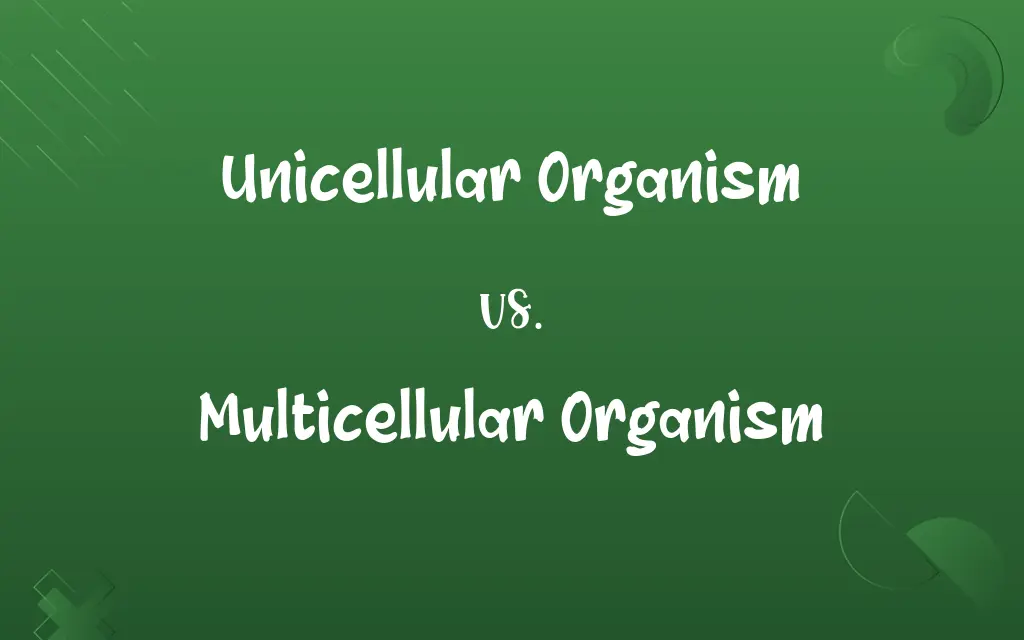Unicellular Organism vs. Multicellular Organism: Know the Difference

By Shumaila Saeed || Published on December 25, 2023
Unicellular organisms consist of a single cell, while multicellular organisms are made up of multiple cells.

Key Differences
Unicellular organisms are living entities consisting of a single cell, carrying out all life functions within that one cell. Examples include bacteria and amoebas. Multicellular organisms, on the other hand, are composed of many cells that specialize in different functions, forming tissues, organs, and systems. Humans, plants, and animals are examples.
Shumaila Saeed
Dec 25, 2023
In unicellular organisms, a single cell performs all tasks like reproduction, metabolism, and survival. These organisms often inhabit extreme environments due to their simple structure. Multicellular organisms have cells that specialize in distinct tasks, such as nerve cells for transmitting signals or red blood cells for carrying oxygen, enabling more complex life forms and behaviors.
Shumaila Saeed
Dec 25, 2023
Reproduction in unicellular organisms typically occurs asexually through processes like binary fission, allowing rapid population growth. In contrast, multicellular organisms often reproduce sexually, contributing to genetic diversity but requiring more time for population growth.
Shumaila Saeed
Dec 25, 2023
The size of unicellular organisms is generally microscopic, limiting their visibility to the naked eye. They have simpler structures. Multicellular organisms vary greatly in size, from tiny organisms to massive beings, and have complex structures with various organs and systems.
Shumaila Saeed
Dec 25, 2023
Unicellular organisms can adapt quickly to environmental changes due to their simple structure and rapid reproduction. However, multicellular organisms often have longer lifespans and can adapt through more complex processes like evolution, though changes occur over a longer timescale.
Shumaila Saeed
Dec 25, 2023
ADVERTISEMENT
Comparison Chart
Function Distribution
One cell performs all functions
Specialized cells for specific functions
Shumaila Saeed
Dec 25, 2023
Reproduction
Often asexual, allowing rapid reproduction
Often sexual, contributing to genetic diversity
Shumaila Saeed
Dec 25, 2023
Size and Complexity
Generally microscopic and simpler
Varies in size, generally more complex
Shumaila Saeed
Dec 25, 2023
ADVERTISEMENT
Unicellular Organism and Multicellular Organism Definitions
Unicellular Organism
A unicellular organism is an individual organism that operates solely within a single cell.
A single-celled bacterium can rapidly divide to form colonies.
Shumaila Saeed
Dec 13, 2023
Multicellular Organism
Multicellular organisms are complex life forms with cells dedicated to specific tasks.
In multicellular animals like dogs, heart cells specialize in pumping blood.
Shumaila Saeed
Dec 13, 2023
Unicellular Organism
Unicellular refers to an organism made up of only one cell.
Certain algae are unicellular and photosynthesize like plants.
Shumaila Saeed
Dec 13, 2023
Multicellular Organism
A multicellular organism is composed of multiple, specialized cells.
Humans, as multicellular organisms, have different cells for different functions.
Shumaila Saeed
Dec 13, 2023
Unicellular Organism
Unicellular organisms are the simplest form of life, with all life processes occurring in one cell.
Yeast, a unicellular organism, is used in baking to make dough rise.
Shumaila Saeed
Dec 13, 2023
ADVERTISEMENT
Multicellular Organism
Multicellular refers to an organism with multiple cells working together.
Seaweed, being multicellular, has distinct cells for different parts of its body.
Shumaila Saeed
Dec 13, 2023
Unicellular Organism
A unicellular organism is a life form consisting of a single cell.
Amoebas, being unicellular, can change shape to move and capture food.
Shumaila Saeed
Dec 13, 2023
Multicellular Organism
Multicellular organisms consist of various cells forming tissues and organs.
A tree, a multicellular organism, has roots, stems, and leaves as organs.
Shumaila Saeed
Dec 13, 2023
Unicellular Organism
Unicellular organisms are characterized by their ability to perform all necessary life functions within one cell.
Plankton, as unicellular organisms, form the foundation of aquatic food chains.
Shumaila Saeed
Dec 13, 2023
Multicellular Organism
A multicellular organism is characterized by a division of labor among various cells.
Insects, as multicellular organisms, have specialized sensory cells for navigation.
Shumaila Saeed
Dec 13, 2023
Repeatedly Asked Queries
Can unicellular organisms live in extreme environments?
Yes, many unicellular organisms thrive in extreme environments due to their simple, adaptable structure.
Shumaila Saeed
Dec 25, 2023
Do unicellular organisms form colonies?
Some unicellular organisms can form colonies, but each cell operates independently.
Shumaila Saeed
Dec 25, 2023
Are unicellular organisms always microscopic?
Most unicellular organisms are microscopic, but some, like certain algae, can be seen with the naked eye.
Shumaila Saeed
Dec 25, 2023
Can multicellular organisms be very small?
Yes, some multicellular organisms, like certain insects, can be very small.
Shumaila Saeed
Dec 25, 2023
How do multicellular organisms grow?
Multicellular organisms grow by cell division and specialization into tissues and organs.
Shumaila Saeed
Dec 25, 2023
What is the main characteristic of multicellular organisms?
Multicellular organisms are characterized by having multiple cells that specialize in different functions.
Shumaila Saeed
Dec 25, 2023
How do multicellular organisms adapt to their environment?
Multicellular organisms adapt through evolutionary processes, which can be slower than unicellular adaptations.
Shumaila Saeed
Dec 25, 2023
How do unicellular organisms reproduce?
Unicellular organisms commonly reproduce asexually, through processes like binary fission.
Shumaila Saeed
Dec 25, 2023
Can multicellular organisms regenerate lost parts?
Some multicellular organisms, like starfish, can regenerate lost parts, but this ability varies.
Shumaila Saeed
Dec 25, 2023
What is the lifespan comparison between unicellular and multicellular organisms?
Unicellular organisms often have shorter lifespans, while multicellular organisms can live much longer.
Shumaila Saeed
Dec 25, 2023
What defines a unicellular organism?
A unicellular organism is defined by its single-cell structure performing all life processes.
Shumaila Saeed
Dec 25, 2023
Do all multicellular organisms have organs?
Most multicellular organisms have some form of organs or specialized structures, though they can vary widely.
Shumaila Saeed
Dec 25, 2023
Is a unicellular organism's single cell similar to a multicellular organism's cell?
While they share basic structures, a unicellular organism's cell is more versatile, performing all life functions.
Shumaila Saeed
Dec 25, 2023
Are viruses considered unicellular organisms?
No, viruses are not considered living organisms and are neither unicellular nor multicellular.
Shumaila Saeed
Dec 25, 2023
Do multicellular organisms have a more complex genetic makeup?
Generally, multicellular organisms have more complex genetics due to their diverse cell types and functions.
Shumaila Saeed
Dec 25, 2023
Can multicellular organisms survive in extreme conditions?
Some multicellular organisms, like extremophiles, can survive in harsh conditions, but generally, they prefer stable environments.
Shumaila Saeed
Dec 25, 2023
Are humans unicellular or multicellular?
Humans are multicellular, with various specialized cells and systems.
Shumaila Saeed
Dec 25, 2023
Can unicellular organisms become multicellular?
In evolutionary terms, multicellular organisms likely evolved from unicellular ancestors.
Shumaila Saeed
Dec 25, 2023
Do unicellular organisms have a nucleus?
Some unicellular organisms, like protozoa, have a nucleus, while others, like bacteria, do not.
Shumaila Saeed
Dec 25, 2023
Do multicellular organisms rely on unicellular organisms?
Yes, many multicellular organisms depend on unicellular organisms for functions like digestion or oxygen production.
Shumaila Saeed
Dec 25, 2023
Share this page
Link for your blog / website
HTML
Link to share via messenger
About Author
Written by
Shumaila SaeedShumaila Saeed, an expert content creator with 6 years of experience, specializes in distilling complex topics into easily digestible comparisons, shining a light on the nuances that both inform and educate readers with clarity and accuracy.









































































